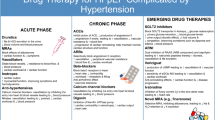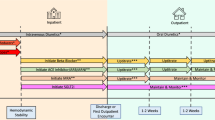Abstract
β-Blockers (metoprolol, bisoprolol, and carvedilol) are a cornerstone of heart failure (HF) treatment. However, it is well recognized that responses to a β-blocker are variable among patients with HF. Numerous studies now suggest that genetic polymorphisms may contribute to variability in responses to a β-blocker, including left ventricular ejection fraction improvement, survival, and hospitalization due to HF exacerbation. This review summarizes the pharmacogenetic data for β-blockers in patients with HF and discusses the potential implications of β-blocker pharmacogenetics for HF patients.
Similar content being viewed by others
References
Jessup M, Brozena S (2003) Heart failure. N Engl J Med 348:2007–2018. doi:10.1056/NEJMra021498
Cohn JN, Archibald DG, Ziesche S et al (1986) Effect of vasodilator therapy on mortality in chronic congestive heart failure. Results of a Veterans Administration Cooperative Study. N Engl J Med 314:1547–1552
The Cardiac Insufficiency Bisoprolol Study II (CIBIS-II) (1999) A randomised trial Lancet 353:9–13. doi:10.1016/S0140–6736(98)11181–9
Reiter MJ (2004) Cardiovascular drug class specificity: beta-blockers. Prog Cardiovasc Dis 47:11–33. doi:10.1016/j.pcad.2004.04.004
Hjalmarson A, Goldstein S, Fagerberg B et al (2000) Effects of controlled-release metoprolol on total mortality, hospitalizations, and well-being in patients with heart failure: the Metoprolol CR/XL Randomized Intervention Trial in congestive heart failure (MERIT-HF). MERIT-HF Study Group. JAMA 283:1295–1302. doi:10.1001/jama.283.10.1295
Poole-Wilson PA, Swedberg K, Cleland JG et al (2003) Comparison of carvedilol and metoprolol on clinical outcomes in patients with chronic heart failure in the Carvedilol Or Metoprolol European Trial (COMET): randomised controlled trial. Lancet 362:7–13. doi:10.1016/S0140-6736(03)13800-7
A trial of the beta-blocker bucindolol in patients with advanced chronic heart failure (2001) N Engl J Med 344:1659–67. doi:10.1056/NEJM200105313442202
Hunt SA, Abraham WT, Chin MH et al (2005) ACC/AHA 2005 Guideline update for the diagnosis and management of chronic heart failure in the adult: a report of the American College of Cardiology/American Heart Association Task Force on Practice Guidelines (Writing Committee to Update the 2001 Guidelines for the Evaluation and Management of Heart Failure): developed in collaboration with the American College of Chest Physicians and the International Society for Heart and Lung Transplantation: endorsed by the Heart Rhythm Society. Circulation 112:e154–e235. doi:10.1161/CIRCULATIONAHA.105.167586
Basile JN (2003) Titration of beta-blockers in heart failure. How to maximize benefit while minimizing adverse events. Postgrad Med 113:63–70
Tandon P, McAlister FA, Tsuyuki RT et al (2004) The use of beta-blockers in a tertiary care heart failure clinic: dosing, tolerance, and outcomes. Arch Intern Med 164:769–774. doi:10.1001/archinte.164.7.769
Khand A, Gemmel I, Clark AL et al (2000) Is the prognosis of heart failure improving? J Am Coll Cardiol 36:2284–2286. doi:10.1016/S0735-1097(00)00995-5
Brodde OE, Kroemer HK (2003) Drug-drug interactions of beta-adrenoceptor blockers. Arzneimittelforschung 53:814–822
Oldham HG, Clarke SE (1997) In vitro identification of the human cytochrome P450 enzymes involved in the metabolism of R(+)- and S(-)- carvedilol. Drug Metab Dispos 25:970–977
Frishman WH (1998) Carvedilol. N Engl J Med 339:1759–1765. doi:10.1056/NEJM199812103392407
von Mollendorff E, Reiff K, Neugebauer G (1987) Pharmacokinetics and bioavailability of carvedilol, a vasodilating beta-blocker. Eur J Clin Pharmacol 33:511–513. doi:10.1007/BF00544245
Gattis WA (2001) Metoprolol CR/XL in the treatment of chronic heart failure. Pharmacotherapy 21:604–613. doi:10.1592/phco.21.6.604.34551
Johnson JA, Burlew BS (1996) Metoprolol metabolism via cytochrome P4502D6 in ethnic populations. Drug Metab Dispos 24:350–355
Lancaster SG, Sorkin EM (1988) Bisoprolol. A preliminary review of its pharmacodynamic and pharmacokinetic properties, and therapeutic efficacy in hypertension and angina pectoris. Drugs 36:256–285. doi:10.2165/00003495-198836030-00002
Meredith PA, Kelman AW, McSharry DR, Vincent J, Reid JL (1985) The pharmacokinetics of bucindolol and its major metabolite in essential hypertension. Xenobiotica 15:979–985
Levin MC, Marullo S, Muntaner O et al (2002) The myocardium-protective Gly-49 variant of the beta 1-adrenergic receptor exhibits constitutive activity and increased desensitization and down-regulation. J Biol Chem 277:30429–30435. doi:10.1074/jbc.M200681200
Rathz DA, Brown KM, Kramer LA et al (2002) Amino acid 49 polymorphisms of the human beta1-adrenergic receptor affect agonist-promoted trafficking. J Cardiovasc Pharmacol 39:155–160. doi:10.1097/00005344-200202000-00001
Mason DA, Moore JD, Green SA et al (1999) A gain-of-function polymorphism in a G-protein coupling domain of the human beta1-adrenergic receptor. J Biol Chem 274:12670–12674. doi:10.1074/jbc.274.18.12670
Mialet Perez J, Rathz DA, Petrashevskaya NN et al (2003) Beta 1-adrenergic receptor polymorphisms confer differential function and predisposition to heart failure. Nat Med 9:1300–1305. doi:10.1038/nm930
Green SA, Turki J, Innis M et al (1994) Amino-terminal polymorphisms of the human beta 2-adrenergic receptor impart distinct agonist-promoted regulatory properties. Biochemistry 33:9414–9419. doi:10.1021/bi00198a006
Green SA, Cole G, Jacinto M et al (1993) A polymorphism of the human beta 2-adrenergic receptor within the fourth transmembrane domain alters ligand binding and functional properties of the receptor. J Biol Chem 268:23116–231121
Small KM, Forbes SL, Rahman FF et al (2000) A four amino acid deletion polymorphism in the third intracellular loop of the human alpha 2C-adrenergic receptor confers impaired coupling to multiple effectors. J Biol Chem 275:23059–23064. doi:10.1074/jbc.M000796200
Tiret L, Rigat B, Visvikis S et al (1992) Evidence, from combined segregation and linkage analysis, that a variant of the angiotensin I-converting enzyme (ACE) gene controls plasma ACE levels. Am J Hum Genet 51:197–205
Rochais F, Vilardaga JP, Nikolaev VO et al (2007) Real-time optical recording of beta(1)-adrenergic receptor activation reveals supersensitivity of the Arg389 variant to carvedilol. J Clin Invest 117:229–235. doi:10.1172/JCI30012
Dishy V, Sofowora GG, Xie HG et al (2001) The effect of common polymorphisms of the beta2-adrenergic receptor on agonist-mediated vascular desensitization. N Engl J Med 345:1030–1035. doi:10.1056/NEJMoa010819
Drysdale CM, McGraw DW, Stack CB et al (2000) Complex promoter and coding region beta 2-adrenergic receptor haplotypes alter receptor expression and predict in vivo responsiveness. Proc Natl Acad Sci USA 97:10483–10488. doi:10.1073/pnas.97.19.10483
Liggett SB, Mialet-Perez J, Thaneemit-Chen S et al (2006) A polymorphism within a conserved beta(1)-adrenergic receptor motif alters cardiac function and beta-blocker response in human heart failure. Proc Natl Acad Sci USA 103:11288–11293. doi:10.1073/pnas.0509937103
Zhu W, Zeng X, Zheng M et al (2005) The enigma of beta2-adrenergic receptor Gi signaling in the heart: the good, the bad, and the ugly. Circ Res 97:507–509. doi:10.1161/01.RES.0000184615.56822.bd
He JQ, Balijepalli RC, Haworth RA et al (2005) Crosstalk of beta-adrenergic receptor subtypes through Gi blunts beta-adrenergic stimulation of L-type Ca2+ channels in canine heart failure. Circ Res 97:566–573. doi:10.1161/01.RES.0000181160.31851.05
Curtis JP, Sokol SI, Wang Y et al (2003) The association of left ventricular ejection fraction, mortality, and cause of death in stable outpatients with heart failure. J Am Coll Cardiol 42:736–742. doi:10.1016/S0735-1097(03)00789-7
Terra SG, Hamilton KK, Pauly DF et al (2005) Beta1-adrenergic receptor polymorphisms and left ventricular remodeling changes in response to beta-blocker therapy. Pharmacogenet Genomics 15:227–234
de Groote P, Helbecque N, Lamblin N et al (2005) Association between beta-1 and beta-2 adrenergic receptor gene polymorphisms and the response to beta-blockade in patients with stable congestive heart failure. Pharmacogenet Genomics 15:137–142
Kaye DM, Smirk B, Williams C et al (2003) Beta-adrenoceptor genotype influences the response to carvedilol in patients with congestive heart failure. Pharmacogenetics 13:379–382. Medline. doi:10.1097/00008571-200307000-00002
Lobmeyer MT, Gong Y, Terra SG et al (2007) Synergistic polymorphisms of β1 and α2c-adrenergic receptors and the influence on left ventricular ejection fraction response to β-blocker therapy in heart failure. Pharmacogenet Genomics 17(4):277–282
Small KM, Wagoner LE, Levin AM et al (2002) Synergistic polymorphisms of beta1- and alpha2C-adrenergic receptors and the risk of congestive heart failure. N Engl J Med 347:1135–1142. doi:10.1056/NEJMoa020803
White HL, Maqbool A, McMahon AD et al (2002) An evaluation of the beta-1 adrenergic receptor Arg389Gly polymorphism in individuals at risk of coronary events. A WOSCOPS substudy. Eur Heart J 23:1087–1092. doi:10.1053/euhj.2001.3037
Magnusson Y, Levin MC, Eggertsen R et al (2005) Ser49Gly of beta1-adrenergic receptor is associated with effective beta-blocker dose in dilated cardiomyopathy. Clin Pharmacol Ther 78:221–231. doi:10.1016/j.clpt.2005.06.004
McNamara DM, Holubkov R, Janosko K et al (2001) Pharmacogenetic interactions between beta-blocker therapy and the angiotensin-converting enzyme deletion polymorphism in patients with congestive heart failure. Circulation 103:1644–1648
Shin J, Lobmeyer MT, Gong Y et al (2007) Relation of beta(2)-Adrenoceptor Haplotype to Risk of Death and Heart Transplantation in Patients With Heart Failure. Am J Cardiol 99:250–255. doi:10.1016/j.amjcard.2006.08.020
de Groote P, Helbecque N, Lamblin N et al (2004) Beta-adrenergic receptor blockade and the angiotensin-converting enzyme deletion polymorphism in patients with chronic heart failure. Eur J Heart Fail 6:17–21. doi:10.1016/j.ejheart.2003.09.006
Lanfear DE, Jones PG, Marsh S et al (2005) Beta2-adrenergic receptor genotype and survival among patients receiving beta-blocker therapy after an acute coronary syndrome. JAMA 294:1526–1533. doi:10.1001/jama.294.12.1526
Terra SG, Pauly DF, Lee CR et al (2005) Beta-adrenergic receptor polymorphisms and responses during titration of metoprolol controlled release/extended release in heart failure. Clin Pharmacol Ther 77:127–137. doi:10.1016/j.clpt.2004.10.006
Zanger UM, Raimundo S, Eichelbaum M (2004) Cytochrome P450 2D6: overview and update on pharmacology, genetics, biochemistry. Naunyn Schmiedebergs Arch Pharmacol 369:23–37. doi:10.1007/s00210-003-0832-2
Taguchi M, Nozawa T, Mizumaki K et al (2004) Nonlinear mixed effects model analysis of the pharmacokinetics of metoprolol in routinely treated Japanese patients. Biol Pharm Bull 27:1642–1648. doi:10.1248/bpb.27.1642
Nozawa T, Taguchi M, Tahara K et al (2005) Influence of CYP2D6 genotype on metoprolol plasma concentration and beta-adrenergic inhibition during long-term treatment: a comparison with bisoprolol. J Cardiovasc Pharmacol 46:713–720. doi:10.1097/01.fjc.0000184117.76188.68
Wuttke H, Rau T, Heide R et al (2002) Increased frequency of cytochrome P450 2D6 poor metabolizers among patients with metoprolol-associated adverse effects. Clin Pharmacol Ther 72:429–437. doi:10.1067/mcp.2002.127111
Zineh I, Beitelshees AL, Gaedigk A et al (2004) Pharmacokinetics and CYP2D6 genotypes do not predict metoprolol adverse events or efficacy in hypertension. Clin Pharmacol Ther 76:536–544. doi:10.1016/j.clpt.2004.08.020
Fux R, Morike K, Prohmer AM et al (2005) Impact of CYP2D6 genotype on adverse effects during treatment with metoprolol: a prospective clinical study. Clin Pharmacol Ther 78:378–387. doi:10.1016/j.clpt.2005.07.004
Johnson JA, Zineh I, Puckett BJ et al (2003) Beta 1-adrenergic receptor polymorphisms and antihypertensive response to metoprolol. Clin Pharmacol Ther 74:44–52. doi:10.1016/S0009-9236(03)00068-7
Wang SL, Huang JD, Lai MD et al (1993) Molecular basis of genetic variation in debrisoquin hydroxylation in Chinese subjects: polymorphism in RFLP and DNA sequence of CYP2D6. Clin Pharmacol Ther 53:410–418
Schwartz SG, Puckett BJ, Allen RC et al (2005) Beta1-adrenergic receptor polymorphisms and clinical efficacy of betaxolol hydrochloride in normal volunteers. Ophthalmology 112:2131–2136. doi:10.1016/j.ophtha.2005.08.014
Acknowledgments
This work was supported in part by NIH grants HL68834, HL74730, GM74492 Bethesda, MD, and American Heart Association postdoctoral fellowship grant 0525474B, St. Petersburg, FL.
Author information
Authors and Affiliations
Corresponding author
Rights and permissions
About this article
Cite this article
Shin, J., Johnson, J.A. β-Blocker pharmacogenetics in heart failure. Heart Fail Rev 15, 187–196 (2010). https://doi.org/10.1007/s10741-008-9094-x
Received:
Accepted:
Published:
Issue Date:
DOI: https://doi.org/10.1007/s10741-008-9094-x




